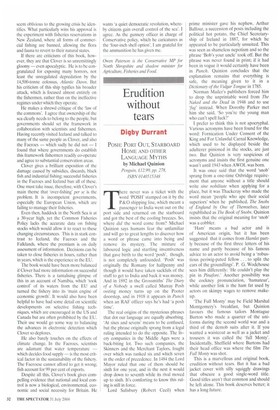Erudition without tears
Digby Durrant
POSH: PORT OUT, STARBOARD HOME AND OTHER LANGUAGE MYTHS by Michael Quinlan Penguin, £12.99, pp. 278, ISBN 0140515348 There never was a ticket with the word `POSH' stamped on it by the P & 0 shipping line, which meant a passenger to India went out on the port side and returned on the starboard and got the best of the cooling breezes. So, where did the word come from? Michael Quinion says humans fear the unfamiliar and will go to great lengths to discover how a word or phrase came into being and remove its mystery. The mixture of laboured logic and startling inventiveness that gave birth to the word 'posh', though, is not completely unfounded. 'Posh' was originally the Romany for halfpenny and though it would have taken sackfuls of the stuff to get to India and back it was money. And in 1892 in the Grossmiths' The Diary of a Nobody a swell called Murray Posh oozing money turns up on the Pooter doorstep, and in 1918 it appears in Punch when an RAF officer says he's had 'a posh time'. The real origins of the mysterious phrases that dot our language are equally absorbing. `At sixes and sevens' means to be confused, but the phrase originally sprang from a legal riding intended to do the opposite. The livery companies in the Middle Ages were a back-biting lot. Two such companies, the Skinners and the Merchant Taylors, fought over which was ranked six and which seven in the order of precedence. In 1484 the Lord Mayor ruled that one of them should be sixth for one year, and in the next it would drop down to seventh while its rival moved up to sixth. It's comforting to know this ruling is still in force.
Lord Salisbury (Robert Cecil) when
prime minister gave his nephew. Arthur Balfour, a succession of posts including the political hot potato, the Chief Secretaryship of Ireland in 1887, for which he appeared to be particularly unsuited. This was seen as shameless nepotism and so the phrase `Bob's your uncle' took off. But the phrase was never found in print; if it had been in vogue it would certainly have been in Punch. Quinion concludes that the explanation remains that everything is safe, the meaning given to it in a Dictionary of the Vulgar Tongue in 1785, Norman Mailer's publishers forced him to drop the unprintable word from The Naked and the Dead in 1948 and to use 'fug' instead. When Dorothy Parker met him she said, `So you're the young man who can't spell fuck?' prefer to think this is not apocryphal. Various acronyms have been found for the word: Fornication Under Consent of the King and For Unlawful Carnal Knowledge, which used to be displayed beside the adulterer pinioned in the stocks, are just two. But Quinion is very suspicious of acronyms and insists the first genuine one wasn't until 1943 when AWOL was born. It was once said that the word 'snob' sprang from a one-time Oxbridge requirement that anyone without a title should write sine nobilitate when applying for a place, but it was Thackeray who made the word mean `people who ape their social superiors' when he published. The Snobs of England by One of Themselves, later republished as The Book of Snobs. Quinion insists that the original meaning for 'snob' was a cobbler.
'Ham' means a bad actor and is of American origin, but it has been suggested that it comes from Hamlet partly because of the first three letters of his name and partly because of his famous advice to an actor to avoid being a `robustious periwig-pated fellow . . to split the ears of the groundlings'. P. G. Wodehouse sees him differently: 'He couldn't play the pin in Pinafore.' Another possibility was the cockney pronunciation, chamateue, while another link is the ham fat used by actors on skimpy wages to remove makeup. The Full Monty' may be Field Marshal Montgomery's breakfast, hut Quinion favours the famous tailors Montague Burton who made a quarter of the uniforms during the second world war and a third of the demob suits after it. If you wanted a waistcoat as well as a jacket and trousers it was called the 'full Monty'. Incidentally, Sheffield where Burtons had their head office was where the film The Full Monty was shot. This is a marvellous and original book, erudition without tears. But it has a bad jacket cover with silly squiggly drawings that obscure a good single-word title. Good titles aren't that common and should be left alone. This book deserves better; it has a long future.


























































 Previous page
Previous page